N.E.C. (football club)
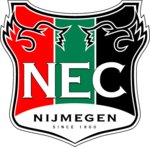 |
|||
| Full name | Nijmegen Eendracht Combinatie | ||
|---|---|---|---|
| Short name | N.E.C. | ||
| Founded | November 15, 1900 | ||
| Ground | McDOS Goffertstadion Nijmegen (Capacity: 12,470) |
||
| Chairman | |||
| Manager | |||
| League | Eredivisie | ||
| 2009-10 | Eredivisie, 13th | ||
| Website | Club home page | ||
|
|||
Nijmegen Eendracht Combinatie, commonly abbrieviated to N.E.C., is a Dutch football club from the city of Nijmegen. The oldest predecessor of the club, "Eendracht" (Dutch for unity), was established on 15 November 1900. In 1903, Eendracht merged with Nijmegen to form the Nijmegen Eendracht Combinatie. They are sometimes, erroneously, referred to as N.E.C. Nijmegen. The team's home ground is the 12,500-seat Stadion de Goffert.
The club has not won any major tournaments to date, though they were runners-up in the KNVB Cup competition in 1973, 1983, 1994, and 2000; they played in the UEFA Cup tournaments in 1983, 2003, and 2008.
Contents |
History
General history
N.E.C. (Nijmegen Eendracht Combinatie or, in English, Nijmegen Unity Combination) is the 41st oldest club in the Netherlands. It was known that the first football club was founded by "ordinary" workers, real people, and boys. Football was in 1900 already quite popular, but a football club was a real elitist activity. Associations as UD (Deventer), Quick (Nijmegen), Sparta Rotterdam, Vitesse, etc. were also all created by the sons of wealthy industrialists, middle and other notables.[1]
Lower City
The founders of N.E.C. had a very different background. They were, without exception, from the old Nijmegen Lower City, the place where the poorest people lived was not much more than a slum. The boys from the Nijmegen-downtown were playing football every day. Not on a field, but on the street and preferably the Waalkade.
Unique was the fact that some of those guys on 15 November 1900 took the decision to own a football club there. They did it all themselves, without help from outside. They coined the name Eendracht and decided that every week for a fee of exactly two cents would be paid. With that money, a new ball could be purchased from time-to-time.
In the first years, Eendracht only played games against teams from other parts of Nijmegen. The ploeggie from the downtown area appeared to be playing good football. When in 1903, a Nijmegen Football Association was formed, Eendracht was the first champion and was thereby promoted to the Geldersche Football Association. The football at Eendracht became a serious matter, especially two years later after promotion to the second class of the KNVB.
The name N.E.C. was established in April 1910. Eendracht merged that year with a club called Nijmegen. Nijmegen had a history of only two years and was founded by members of the above called Quick who felt absolutely no place in that elite club. The Nijmegen Eendracht Combination seemed a golden finding.[1]
Money
It took decades for the first big successes came. Indeed, only in 1936, N.E.C. was finally promoted to the First Class, which was the highest level. That N.E.C. had crept to reach the top had many causes, but the most important thing was money, or rather, lack of money.
N.E.C. was a boys club of normal and hard-working people. There were no rich members who could do a gift. The expectorate fee was often a problem, especially during crises such as World War I. N.E.C. kept holding warm relations with the local directors. Indeed, the leading figures in Nijmegen looked pretty down to N.E.C.[1]
Never First Classer
In the beginning of the 1920s, the situation became slightly better. N.E.C. bought land and moved to the Hazenkampseweg. Finally, the club had his own sports complex. Above it, the memberships increased rapidly and N.E.C. became more popular. After that, there were frustrating years. To achieve promotion to the first class, it was in those years not enough to become the champion of the second class. Stressful decision matches were always being played. Although N.E.C. become champion in 1928, 1929, 1931, and 1934, the club was not promoted. The club was already called mockingly a "Never First Classer." Until 1936, N.E.C. finally took the last obstacle. They won the decision matches and reached the First Class.[1]
Golden Years
Immediately after their promotion, there followed a period of great sporting achievements. The question remained always how the honors of N.E.C. were looking when World War II had not broken out at the stage that N.E.C. became a top-club.
N.E.C. won in 1939 the first East title and fought for the title of the Netherlands with the other four district champions. N.E.C. became third, behind AFC Ajax and DWS from Amsterdam. During the war, there could hardly played a football match, but after the liberation, N.E.C. took the thread simply and became in 1946 again the champion of the East. In 1947, N.E.C. took this title again; in this year, N.E.C. became again the third-most successful club in the Netherlands.[1]
Professional football
For N.E.C., the introduction of professional football in 1954 came just at the wrong moment. The club had internal problems, had a few less years behind it, and financially it was not doing well. Netherlands called at this moment more than 80 paying clubs and the KNVB reorganized. Each time the competitions were classified otherwise, N.E.C. fell ever further away. At the last minute, N.E.C. was saved from a return to the amateurs. Just in the beginning of the 1960s, N.E.C. was growing slowly upwards again.
A major reason was that the city of Nijmegen began to see the importance of a paid club like the Nijmegen Eendracht Combinatie. N.E.C. could finally count on financial support in 1963. In 1964, N.E.C. was promoted to the first division again and three years later, N.E.C. reached finally the First League.[1]
Full stadiums
Then followed some years whereat the Nijmegen-residents are still thinking back to melancholy. The Goffert was full every game; the season averages of 14,000 spectators were normal. There was even a year (1970–71) in which N.E.C. had 18,000 viewers per game. N.E.C. flourished at this time, primarily on the great youth development and scouting.
Talented players were trained, played in the first team and, after a number of years, were sold for high fees. Frans Thijssen and Jan Peters are in that respect the most famous players. Although never won a prize, N.E.C. was really famous at this time, but the first signs of decline came quickly. N.E.C. actually lived above his position: the budget came only around by selling players and a strong subsidy from the municipality.[1]
Lean years
The degradation of 1974 was a kind of warning. N.E.C. graduated a year later again and was also seventh in the league, but it was going wrong again at the beginning of the 1970s.
No one could turn the tide; N.E.C. were in a downward spiral. Each year, the team fought against relegation and fewer spectators were watching the matches. N.E.C. was each year a top club in the first division or a tail club in the major league. The list is significant: relegation in 1983, promotion in 1985, relegation in 1986, promotion in 1989, relegation in 1991, and finally promotion in 1994. N.E.C. suffered many difficult years and disappeared almost from professional football from time-to-time. In 1981, the club got only support from the town when the professionals and amateurs would be separated. In 1987, the club was bankrupt, but N.E.C. remained existent only because 80% of all creditors waived their claims.
The chairman Henk van de Water formed the sponsor club OSRN on which N.E.C. got a little air. Just in the mid-1990s, N.E.C. found their way up again. Three years later, the club remained at the last minute in the Eredivisie, but in 1998, N.E.C. surprised many with an 8th place finish. Meanwhile, the prospects excelled. The audience numbers were rising continuously, all the way up to 10,000. The sponsor club was growing out of its jacket and there was a nice future up ahead in the new Goffertstadion.[1]
The cup finals
N.E.C. reached the cup-final four times. Twice N.E.C. were the underdogs, but on 31 May 1973, the club was the towering favorite. In De Kuip against NAC Breda, it, however, went completely wrong. N.E.C., with coach Wiel Coerver and players such as Jan Peters, Frans Thijssen, Harrie Schellekens, Jan van Deinsen, and Cas Janssens, could not reach their expectations. Rather, by internal problems, there was an internal fight at N.E.C. and NAC Breda won 2-0.
In 1983, it was actually a miracle that N.E.C. reached the cup-final. The club from Nijmegen were relegated that season, but reached the final. The opponent was AFC Ajax, and the club from Amsterdam was in two matches clearly better. The Amsterdammers won two times three against one.
In 1994, it was again remarkable that N.E.C. was in the final. Indeed, N.E.C. was a first-division club. But one with a very good team; a month later, they promoted via the Nacompetitie. N.E.C., with players such as Lok, Hoekman, van Wonderen, van der Weerden, and the lightning-quick Bennie Dekker, were already surprising in the semi-finals. Ajax was beaten in De Meer 2-1. In De Kuip at Feyenoord, Feyenoord won 2-1.
In the year of the 100-year anniversary of the club (2000), N.E.C. reached again the cup-final. The competition presentations were not too good and hardly participation at the Nacompetitie was averted. The final against Roda JC for the 20,000 fans from Nijmegen was more or less a disappointment. N.E.C. lost with no chances 2-0. The semi-finals (profit after penalties against AZ) were a highlight for many fans.[1]
Nijmegen Europe Cup
In 1983, just in the darkest period of the club history, there was also a nice point in the history. N.E.C. played in the European Cup against FC Barcelona, while N.E.C. was at that time a mid-engine in the First Division.
N.E.C. lost in the spring the cup-final against Ajax and relegated also to the First Division. But because the Amsterdammers became also champion of the Netherlands, N.E.C. made the unique fact that a First Division club was registered for the Eurocup II tournament; this performance was never repeated again in the Netherlands.
In the first round of the European tournament, N.E.C. defeated Norway's SK Brann. This was a very little club, but N.E.C. had some problems to defeat the club from Norway. In Nijmegen, it became 1-1 and two weeks later Michel Mommertz scored in Bergen the winning hit (0-1).
A few days later, the draw was done for the second round; the city of Nijmegen stood on his head in anticipation. Barcelona, the club that had world superstars Diego Maradonna and Bernd Schuster, were coming to Nijmegen. Both star players were injured by 19 October and did not take part in the games. But this was no big disappointment for the 25,000 spectators in the Goffertstadion. N.E.C. took the lead with strikes from Anton Janssen and Michel Mommertz to make the score 2-0. It was a thrill for Barcelona but they came back and eventually won 3-2. For the second leg in Barcelona, it was an easy game for the Catalans, which ended in 2-0 for the home team.
29 May 2003 was classified as a historic day. For the first time in the existence of the club, N.E.C. qualified on their own for the UEFA Cup. By the late hit from Jarda Simr, N.E.C. finished in 5th place in the Eredivisie. This led to unprecedented peak scenes; happy fans on the pitch in Waalwijk, an explosion of joy for over 5,000 supporters in the Goffert who watched the game on a large video screen and it was followed by a great homage in the center of Nijmegen. There were more than 25,000 people at this celebration.[1]
2008
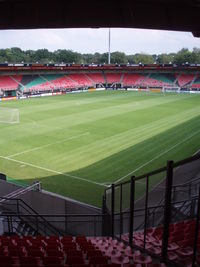
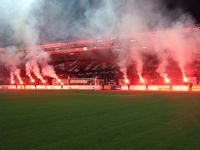
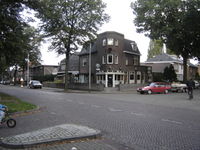
In 2008, N.E.C. qualified for the third time in its history for European competition. With this, Mario Been followed in the footsteps of former-coach Johan Neeskens. After a disappointing first half of the year the club was positioned on the bottom of the Eredivisie (17th place). But after the winter break, there was a remarkable resurrection from the Nijmegenars. From January 2008, N.E.C. played terrific football and scored many goals. Victory after victory resulted in an excellent 8th place in the Eredivisie. This position was rewarded by participation in the UEFA Cup play-offs. N.E.C. was also superior in the play-offs beating Roda JC, FC Groningen, and NAC Breda. With 31 undefeated matches in a row and with a 6-0 home victory at NAC Breda the highlight, N.E.C. reached European football again. The return match at Breda was a formality, but the team was also victorious. What followed was a great homage to many thousands of fans on the Goffertwei.[1]
The year became even more successful following early rounds of the UEFA Cup. In the first round, the club defeated Dinamo Bucureşti in two heartstopping matches. After a 1-0 winning home game, N.E.C drew 0-0 in Romania to reach the group-stage of the UEFA Cup. The club from Nijmegen was then drawn against larger European clubs Tottenham Hotspur, Udinese, Spartak Moscow, and Dinamo Zagreb. All the experts gave the club little chance of reaching the next round, but N.E.C. defied the odds. After a stunning match against Zagreb, with a goal from Dinamo in the last minute, there stood a disappointing 3-2 on the scoreboard. N.E.C. were perhaps the better team but gained no points. After this, English team Tottenham came to the McDOS Goffertstadion and won with a score of 0-1. The club from Nijmegen was on the bottom of the pool and was almost out of the tournament. But there was hope in the Netherlands after a 1-2 victory against Spartak Moscow in Russia with a very important goal from Lasse Schöne. N.E.C. played its last match in Nijmegen against Udinese. To go to the next round, N.E.C. and Tottenham had to win (from Spartak Moscow). Tottenham were behind and after 45 minutes, while there was a disappointing 0-0 on the scoreboard in Nijmegen. But in the 74th minute, there was a sensational moment: Tottenham scored to eventually win 2-1 against Spartak and Collins John almost simultaneously scored to make the score 1-0 for N.E.C. With a second goal from Jhon van Beukering (his third European goal of the season), N.E.C reached the next round.
The last 32 draw of the UEFA Cup saw N.E.C. fixtured to play against big German club Hamburger SV. The fairytale ended for the club from Nijmegen when the Germans won 0-3 in the Goffertstadion and 1-0 in Hamburg. However, the progression into the last 32 capped off the most successful year in the club's history. N.E.C. was lauded for their terrific football and their sociability. Supporters were complimented in Europe, especially by Franz Beckenbauer, who said he had never witnessed such great ambiance from away-supporters and that Premier League clubs had never seen so many away-fans at a club-match (4,500).[2]
Stadium
N.E.C. plays its home matches in the De Goffert stadium (12,500 seats). The stadium was originally opened in 1939 and featured a cycling track between the pitch and the stands. In 2000, the rebuilt stadium was opened. The club wants to expand the stadium to 20,000 seats in 2011.
Rivals
Football club Vitesse of Arnhem is the main rival of N.E.C. The annual games between the two are called "de Gelderse derby." The rivalry has led to hooligans meeting after games that resulted in fights and public disorder.
Players & Staff
Current squad
As of 28 February 2010.[3]
For recent transfers, see List of Dutch football transfers summer 2009 and List of Dutch football transfers winter 2009-10.
Note: Flags indicate national team as has been defined under FIFA eligibility rules. Players may hold more than one non-FIFA nationality.
|
|
Out on loan
Note: Flags indicate national team as has been defined under FIFA eligibility rules. Players may hold more than one non-FIFA nationality.
|
Staff and management
Note: Flags indicate national team as has been defined under FIFA eligibility rules. Players may hold more than one non-FIFA nationality.
|
N.E.C. in Europe
| Season | Competition | Round | Country | Club | Score |
|---|---|---|---|---|---|
| 1969/70 | Intertoto Cup | Group, match 1 | MŠK Žilina | 1-1, 1-2 | |
| Group, match 2 | Örebro | 0-0, 1-1 | |||
| Group, match 3 | Bellinzona | 2-0, 3-3 | |||
| 1978/79 | Intertoto Cup | Group, match 1 | Antwerp | 3-2, 0-2 | |
| Group, match 2 | Duisburg | 4-2, 0-6 | |||
| Group, match 3 | Bordeaux | Total: 3-4 | |||
| 1983/84 | UEFA Cup Winners' Cup | First Round | Brann | 1-1, 1-0 | |
| 1/8 Finals | Barcelona | 2-3, 0-2 | |||
| 1986/87 | Intertoto Cup | Group, match 1 | Fortuna Düsseldorf | 4-3, 0-3 | |
| Group, match 2 | MTK Hungária | 0-3, 2-2 | |||
| Group, match 3 | RFC de Liège | 0-1, 1-1 | |||
| 2003/04 | UEFA Cup | First Round | Wisła Kraków | 1-2, 1-2 | |
| 2004/05 | Intertoto Cup | Second Round | Cork City | 0-0, 0-1 | |
| 2008/09 | UEFA Cup | First Round | Dinamo Bucureşti | 1-0, 0-0 | |
| Group Stage | Dinamo Zagreb | 2-3 | |||
| Tottenham Hotspur | 0-1 | ||||
| Spartak Moscow | 2-1 | ||||
| Udinese | 2-0 | ||||
| Third Round | Hamburg | 0-3, 0-1 |
N.E.C. records
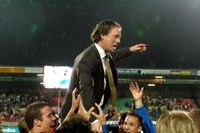
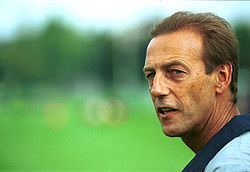
| Record | Notes | Date | |
|---|---|---|---|
| Highest attendance (competition) | 32,000 | Against Ajax | 21-04-1968 |
| Lowest attendance (competition) | 1,000 | Against Roda JC | 14-05-1983 |
| Biggest win | 0-22 | Against Overasseltse Boys | 09-08-2008 |
| Biggest win (competition) | 0-7 | Against FC Den Bosch '67 | 10-03-1973 |
| Biggest loss (competition) | 9-1 | Against Ajax | 05-11-1967 |
| Match with highest score (competition) | 3-7 | Against RBC Roosendaal | 04-01-1967 |
| Most wins on a row | 10 | 04-04-2008 until 30-08-2008 | |
| Most defeats in a row | 10 | 03-10-1971 until 14-11-1971 | |
| Most matches without defeat | 31 | 24-02-2008 until 21-09-2008 | |
| Most matches without win | 16 | 22-01-1978 until 02-09-1978 | |
| Most matches without goal | 7 | 03-03-1968 until 19-05-1968 | |
| Most matches without goal against | 7 | 21-10-2005 until 18-12-2005 | |
| Top goalscorer | Hans Venneker | 19 | 1967–1968 |
| Most goals in a competition-match | Cas Janssens | 4, Against FC Den Bosch '67 | 10-03-1973 |
| Youngest player (competition) | Jan Peters | 17 years, 0 months, 25 days | |
| Highest competition-rank | Eredivisie | 5th Place | 2002–2003 |
| Lowest competition-rank | Eerste Divisie | 10th Place | 1964–1965 |
| Most matches (Eredivisie) | Sije Visser | 342 | |
| Most goals scored (Eredivisie) | Frans Janssen | 54 | |
Achievements
- Eredivisie Winner Play-Offs: 1
-
- 2007-08
- KNVB Cup runner-up: 4
-
- 1972-73, 1982-83, 1993-94, 1999-00
-
- 1974-75
- 1e Klasse: 3
-
- 1938-39, 1945-46, 1946-47
Managers
Source. [4]
|
|
|
Notable players
|
|
Man of the Year
| Season | Name |
|---|---|
| 2000/01 | |
| 2001/02 | |
| 2002/03 | |
| 2003/04 | |
| 2004/05 | |
| 2005/06 | |
| 2006/07 | |
| 2007/08 | |
| 2008/09 | |
| 2009/10 |
Topscorers by season
| Season | Name | Goals |
|---|---|---|
| 1994/95 | 8 | |
| 1995/96 | 9 | |
| 1996/97 | 8 | |
| 1997/98 | 13 | |
| 1998/99 | 16 | |
| 1999/00 | 9 | |
| 2000/01 | 15 | |
| 2001/02 | 7 | |
| 2002/03 | 9 | |
| 2003/04 | 10 | |
| 2004/05 | 8 | |
| 2005/06 | 10 | |
| 2006/07 | 9 | |
| 2007/08 | 11 | |
| 2008/09 | 6 | |
| 2009/10 | 8 |
See also
- Dutch football league teams
References
- ↑ 1.00 1.01 1.02 1.03 1.04 1.05 1.06 1.07 1.08 1.09 1.10 "History at official N.E.C. website". N.E.C.]. http://www.nec-nijmegen.nl/layout.php?p=3&page=3. Retrieved 2009-06-14.
- ↑ "Franz Beckenbauer about great ambiance N.E.C. Supporters". De Trouwe Honden. 2009-03-17. http://www.detrouwehonden.nl/dbid=106/tpl=1937.
- ↑ "Players". N.E.C. Nijmegen. http://www.nec-nijmegen.nl/layout.php?p=4. Retrieved February 28, 2010.
- ↑ "Managers". N.E.C. Nijmegen. http://www.detrouwehonden.nl/dbid=59/tpl=1910/trainers. Retrieved 2010-07-1.
External links
- Official
- Official website of N.E.C. (Dutch) / (English)
- Eredivisie.nl Official website Dutch Eredivisie (Dutch)
- General fan
- NEC Supportersforum (Dutch) / (English)
- Official website Supportersclub (Dutch) / (English)
- Fansite HKN (Dutch)
- Fansite ForzaNEC (Dutch)
- Fansite NECfan.nl (Dutch)
- NECToday.nl (Dutch)
- Fansite De Trouwe Honden (Dutch)
- Fansite NEC Nijmeguh (Dutch)
- News
- Football-Lineups.com / N.E.C. (English)
- VI / N.E.C. (Dutch)
- Headliner / N.E.C. (Dutch)
- Multimedia
- N.E.C. Radio (Dutch)
|
|||||
|
|||||